Get an as-is cash offer for your home
"*" indicates required fields
Being a landlord has lots of potential pitfalls. Learn the pitfalls to avoid and steps involved in renting out your home that will make you more successful.
Want to find out if your home is a good rental prospect? Check out our rental property evaluation calculator.
Not everyone aspires to be a landlord, but occasionally someone finds themselves becoming an accidental landlord. They may have a family member who needs a place to live or received an inherited house. They may also need to move but unable to sell their current home. When these situations happen, many people think about how they can rent their house out. We walk you through the process, step by step.
How much can I rent my house for?
You’re probably already asking “How much rent can I get for my home?” The amount of rent you can charge will depend upon the number of bedrooms, the condition of your home and the neighborhood. Fortunately, there are many tools available to determine what rents are for your home and neighborhood.
Two popular website tools are Zillow and RentoMeter. Each of these tools will give you a map of the surrounding rental properties near your home and approximately what these properties are renting for. I say “approximately” because unlike property managers, these websites really only know what a rental was advertised for. Let me explain, you can advertise your property at $2,000 a month with these services. However, what if you find you had to rent your home for $1,850 a month to get a tenant? These services would not know that you reduced your rent.
One of the cool things I like about RentoMeter is their dashboard meter. This provides a nice graphical view of the range of rents for similar houses. I can see both the low and high values as well as the mid-range of rents that my house my rent for.
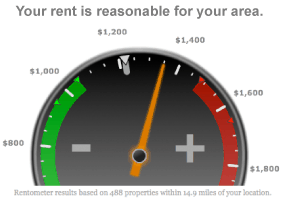
Another method of determining what your home will rent for is Craigslist. Start by choosing the city where you want to advertise and then select “apts/housing” under the housing section.
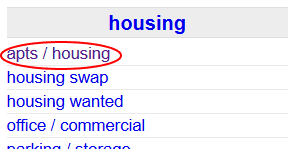
Next, look to the left hand side of the page. This is where you can limit the results to houses versus apartments, number of bedroom and more. Again, Craigslist won’t know what properties actually rent for, only what people are advertising. It’s not uncommon to see the same house several weeks later at a reduced rent because the landlord was unable to rent their house at the higher price. It helps to also look for properties that are being advertised by property managers. These companies will probably have multiple properties in the area and will have a good idea of what properties might rent for. We’ll look at property management company pros and cons later in this article.

Will it generate enough rental income?
This is a very important question every landlord needs to ask, especially if you have a mortgage on the property. Every rental property has both regular and unexpected expenses. You will need more money for repairs when you rent your home than if you lived in it. As a broad rule of thumb many investors and landlords try not to let their expenses exceed 60% of the monthly rental income. Investors refer to this amount as their Net Monthly Income, or NOI.
Monthly rent – Mortgage – Insurance – Property Taxes – Vacancy – Repairs = Net Monthly Income
If the Net Monthly Income is less than 60% of their monthly rent, they consider the property a poor investment property.
Let’s use an example:
2,000 monthly rent – 425 mortgage – 80 insurance – 90 property taxes – 50 vacancy reserve – 75 repairs = 1380 Net Monthly Income
In the a above example, the net income is 69% of the monthly rents and therefore it would be a rental a person could afford to keep. If the rents were much less or any of their expenses higher, it might be a money pit, rather than an investment. This is not the only formula a landlord might consider using, but it is simple enough that it works if you’re considering renting your home out.
Landlord Insurance
You probably already have homeowners insurance, but if you are going to rent your home out for anything other than a few days, you will need to have landlord insurance.
What’s the difference between landlord and homeowners insurance you ask? The key difference is that landlord insurance protects you from liability should your renter get hurt on your property. Let’s suppose your tenant has a dog that bites someone, even if they weren’t supposed to have a dog. You would want to have landlord insurance to at least have some degree of protection from a lawsuit. However, the insurance company might still deny your claim if the dog breed was excluded on your insurance policy.
You will also want to make sure your tenants have proper renter’s insurance. Should your rental property have a catastrophic loss such as a fire or flood, your landlord insurance would not protect your tenants’s belongings. Only tenant insurance purchased by your tenants can provide this.
Can I rent my house for without an agent?
Anyone can rent out their home without an agent or a property manager. However, their are many fair housing laws that must be followed. You cannot discriminate against anyone based on race, familiar status, or religious beliefs. Familiar status includes whether or not your tenants are married or have children.
If you are going to manage your own rental, there are several classes held by local rental apartment associations that can help you stay familiar with the rules. It’s important to connect with one of these groups as the rules can change every year, especially in California where the laws are very pro tenant.
How to Choose a Good Property Management Company
If you live out of town or do not wish to deal with tenant problems directly, you can hire a property manager. If you live out of town, many cities, including Sacramento, require that you have a local person responsible for the management. Property managers will rent out your property, take late night calls for plugged toilets and respond to requests for repairs.
I suggest you start by managing your property yourself. This way, you can get a better understanding of the process. If later you decide you want to hire a property manager, you’ll have a better idea of what you want from them. Keep in mind that property managers only make money when they can charge for their services. That means it’s not in their financial best interest to keep your renters long term or reduce service calls.
Related story: How to hire a property manager for your out of state property
How to Get your Landlord in Trouble
Does this heading seem out of place? This is actually a commonly searched phrase on Google. Does this tell you anything? There’s plenty of good renters, but all it takes is one bad tenant before you decide you don’t want to be a landlord anymore. Property management is one of the most sued professions there is. You may want to consider reading Yelp reviews of any property manager before hiring them. The reviews will mostly be from tenants, but you’ll get a good feel for how they respond to difficult tenants.
Does your City Have Rental Inspections?
Many cities require regular rental inspections to reduce housing blight. Sacramento and Rancho Cordova both have rental inspection departments and require regular inspections. If you live in one of these cities, you will have to register your home with their rental inspection program and pay an annual fee. These programs are typically part of the city’s code enforcement division. They will usually require a inspection every two years of the inside of the home. During the inspection, the city inspector will walk through the home with a checklist of items to check. If you haven’t done so already, be sure to check these common rental housing code violations.
City of Sacramento’s Top 10 Rental Housing Violations
- Smoke Detectors
- Electrical Service
- No GFCI in bathrooms
- Lack of Weather Protection
- No door viewer and missing unit number at front door
- Water Heater Installation
- Improper Venting
- Unapproved Plumbing
- Hazardous Wiring
- Inadequate Permanent Heating
You should always attend the inspections with the inspector. If you have a property management company, you should have the management company attend the inspection for you. In addition to seeing any problems the inspector points out, it gives you an opportunity to see the condition inside your rental property. If violations are found, you will usually have 30 days to correct them. Some violations require a re-inspection and an additional fee. In some rare cases, an inspection may find hazardous living conditions that require you to put the tenant up in a hotel at your expense, while you fix the problem.
How to list your rental on Craigslist
If you have decided to manage your own rental property, you will most likely list your rental on Craigslist. If you don’t have an account yet, start by selecting “My Account” in the upper left corner of your screen. After creating your account, you can select “create posting”.
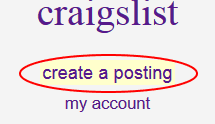
And then “housing offered”.
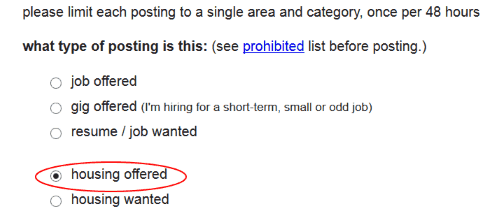
Complete the process answering the remaining prompts to create your ad. Be sure to include the number of bedrooms, monthly rent, any security deposits and whether pets are permitted. Be aware you must not discriminate against prospective renters with service animals even if you have said “No pets”.
Performing Tenant Screening and Initial Rent Up
Rental Criteria
Every home should have a specific rental criteria prior to advertising the property. Your criteria might be that a tenant’s gross monthly income has to be 2 1/2 times the monthly rent. It might also be no pets. It’s even better if this criteria is written down documented. You want this decided before you start advertising so you can be consistent. If you look like you’re turning clients away because your qualifications are changing, then you could be threatened with a lawsuit for discrimination. Remember, there are many lawsuits filed against landlords for unfair discrimination. Be safe, write down your criteria, and stick with it.
Things to Include in Your Rental Criteria
What’s Your Rental Criteria?
- Minimum monthly income?
- Work history?
- Do you allow pets?
- Minimum credit score?
- Rental history?
- Are bankruptcy’s okay?
- Completed rental application required?
1. Minimum monthly income
If you aren’t sure what to require for minimum monthly income, look at the local Craigslist ads. You might want your tenants to make three times the monthly rent, but it may not be typical for the neighborhood. If you’re requirements are too high, you will have problems renting your house out. If it’s too low, you may find yourself with sub par tenants.
2. Work History
How long does a prospective tenant need to have worked at their recent job? Are job transfers okay? Do they have a history of moving from job to job? You need to document what is and is not acceptable to you.
3. Do you allow pets?
Remember you cannot discriminate against service animals.
4. What is the minimum required credit score?
Will a credit score of 650 be acceptable or will you require a credit score of 720? You should be able to answer this question when a prospective tenants call you. Don’t expect to be able to have the same credit score requirement for a C neighborhood as you would for a B+ neighborhood. Don’t know what credit score you want to use for a specific house? Look for locally advertised rentals and call them to find what they are requiring.
5. Rental History
This is always the hardest to evaluate. It’s hard to know if what your prospective tenant has put on their application is the truth. A good way of checking is to compare their application against their credit report to verify addresses. Start by calling landlords other than their current landlord. If they’re a problem tenant, current landlords will more than likely give a glowing report because they want their tenant to move. Ask landlords how timely they were making rent. How many times were they late paying rent? Did they ever have complaints from the neighbors about the tenants? These are all good questions to ask.
6. Are bankruptcies okay?
This is up to you. At a minimum, you may want to make sure prospective tenants have no open bankruptcy’s.
7 Completed rental application
This seems obvious, but many rental applicants leave information off of their application. It might be intentional, or it might be by accident. You can always follow up with applicants who leave items off of their application. Better yet, if applicants personally hand you an application during your open house, take a moment to scan it for missing information. If something is missing, ask them to correct it or put a note in as to when they will provide it to you.
Can I have different requirements for different properties?
Yes. Your rental criteria does not have to be the same from house to house. If you have two different rental properties with different monthly rents or different neighborhoods, you might want different criteria for each house. Just remember to be consistent for each individual rental property.
Showing times
Trying to arrange times for tenants to see your home can drive you crazy. You’ll have prospects call you and ask if they can see your rental right away. You rearrange your schedule, drive to the property only to have the tenant be a no show. To avoid this headache, arrange two or three open house times. Tell prospective tenants that this will be the only times your home will be available to view.
I actually like including the showing times in our Craigslist ad.
Application and Contract/Lease Agreement
You can obtain rental application and lease agreement online or at most office stores. You can also obtain these through your local apartment association. Make several copies and leave several applications at the property for prospective tenants. If you put out a For Rent sign, attach a flyer box to your sign and put the applications in the box. Encourage tenants who call you from your ad to drive by the property to verify that they like the neighborhood.
It might also be a good idea to place your contact information on the inside of a front window. This makes it harder for potential scammers to try to rent out your house. Prospective tenants will at least be able to have a clue as to who the real landlord is.
Pre-Screen Before Credit Check
One nice thing you can do for prospective tenants is pre-screen them before asking them to pay for a credit check. With pre-screening, you are making sure they meet your rental policy requirements. Do they meet your requirements for income, rental history, etc. If a prospective tenant has not completed the application, doesn’t have sufficient income or rental history, you don’t need them to spend money for a credit check.
Credit Check
You should always run a credit check on prospective tenants. Trans Union’s My Smart Move service allows you to setup your rental address and send your tenants directly to their website to perform a credit check.
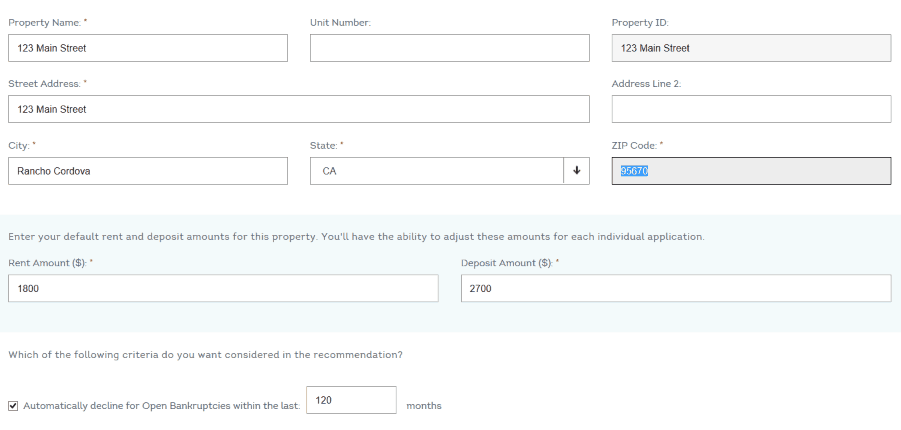
Using the service, you can send an email to prospective tenants to login and submit their credit information. One nice feature of this is that your tenant pays Trans Union directly rather than you. This frees you up from having to collect fees.
You should not expect to make money off of application fees or credit checks. Most states limit the amount of money you can charge to process application to a very small fee. The amount is so little, that it really isn’t even worth the hassle of collecting.
Rental Contract
You never want to let a tenant move in without every adult occupant signing the lease agreement first. It should specify any criteria that are specific to the house. Did you specify “no pets”? Do you require a truck mounted cleaning company clean the carpets on move out? These should all be included in your rental agreement. I would recommend against using a boilerplate rental agreement from the local office supply store. Instead, contact the local rental housing association to obtain your contract. It’s more likely to be legally up to date protect you better. You can query the National Apartment Association to find a local rental associations.
Tenant Move-In Inspection Form
When you are ready to give the keys to your new tenant, it’s time to do a walk through with your tenant. As you walk through the home, note any existing damage or broken items. These items should be written down on a move in inspection form. You can make your own form or use one like that provided by HUD. Once you and the tenant have agreed to the condition of the property, you each need to sign the inspection form. You’ll need this form when your tenant moves out to identify any new damage that the tenant may be responsible for.
Security Deposit
Different states have different rules regarding how much you can ask for as a security deposit. In California the maximum security deposit can be no more than two times monthly rent for unfinished properties. For furnished properties, the maximum is three times the monthly rent. Security deposits should be collected via cashier’s check prior to the tenant moving in.
It’s important to remember that the security deposit is not your money. Many landlords get into serious legal trouble when their tenants leave and the landlord does not have the funds to give back the tenants security deposit. We’ll talk more about this later.
Rental Termination Process
How to write a 30 day Notice to Vacate Letter
At some point in time, you’ll need to ask a tenant to move. This may be because you want to sell the property or because you have a bad tenant. If you have a reasonable tenant, sending them a Notice to Vacate is much cheaper than having to evict them. Depending upon how long your tenant has rented your home, you will have to either give 30 or 60 days notice.
California requirements for notice to vacate
In California, if your tenant has occupied the property for one year or less, then you can give a 30 day notice. If they have been your tenant for year and a day, then you will need to give them a 60 day notice. In California, you usually do not have to provide a reason for why you are asking them to leave. It’s probably better that you don’t give a reason if your tenants are problematic. If your home is in a city with rent control, you may have additional steps you must take.
How Rent Control Complicates your Notice to Vacate
Some cities, like Berkley and San Francisco, have strict rent control rules. One of the more devious rules of rent control is what proponents call “just cause eviction”. This rule requires the landlord to give a reason why they are asking the tenant to move. The only allowed reason, is the seller moving into the house. Otherwise, the landlord has to pay the tenant money. This can amount to several thousand dollars and is meant to discourage landlords from selling. Fortunately, Sacramento does not have rent control yet, but there’s been a lot discussion of rent control in the city. If your property is in a rent control area, you should think very seriously before placing your property as a rental.
Update: Sacramento has recently passed rent control measures. Additionally, every election there seems to be an initiative to repeal existing rent control prohibitions.
Pre-Move out inspection
I like to schedule two move out inspections. We schedule one move out inspection as soon as the tenant gives us notice that they are moving. During this inspection we identify items that the tenants will need to correct to receive their full security deposit back. Tenants appreciate being able to correct items on their own so they can get all of their security deposit back.
Normal Wear and Tear
It’s important to note that you cannot charge tenants for normal wear a tear. A carpet has a five year useful life. If you’re trying to have your tenant pay for a new carpet that’s 7 years old, you you’ll end up in court. However, if you put new carpet in last year and it’s now stained and trashed, that is a reasonable deduction.
Carpet Cleaning
Many rental contracts state how the carpets must be cleaned before vacating. We like to insist that carpets must be cleaned by a truck mounted cleaning company. We want professional cleaning of our carpets. If you don’t specify this in your rental contract, then your tenants can clean it themselves. The result will likely be that they rent an inadequate unit from the local grocery store and end up permanently setting any stains in the carpet.
Final Move Out Inspection
This should be done once the house is empty and your tenant has moved out. You don’t want any damage hidden behind couches or pictures. You also need to bring the initial Move In Inspection form that you and the tenant completed when they moved in. As you walk around the house, write down any new damage that is not normal wear and tear. Take your time doing your inspection. It’s amazing how tenants can hide poorly done repairs or problems that you won’t see until after they have moved away. If you miss something, you may likely have to pay for the corrections yourself, especially if you live in a pro tenant state. Lastly, have your tenant sign it and note anything that they may disagree with.
Caution: You should only deduct the cost for damages for items documented on your move out inspection. Otherwise, your former tenant might seek legal action against you.
Return of Tenant’s Security Deposit
In California, the landlord has 21 days to return the security deposit. Failure to return a security deposit in a timely fashion is punishable with a fine of three times the amount of the security deposit. As stated earlier, the security deposit is the tenant’s money and should always be kept separate from other funds. Saying, “I spent it” or “I didn’t have the money to pay them right away” before a judge is likely to be very expensive.
First and Last or Simple Security Deposit?
As a matter of precaution, we don’t like to ask for First and Last months’ rent as a security deposit. When tenants think they’re last month’s rent is part of the security deposit, they simply don’t pay the last month’s rent. This leaves you short of money should there be significant damage. It also doesn’t encourage tenants to give you notice that they are moving. They simply seem to disappear in the middle of the night.
Final Thoughts on Renting out your Home
Renting out a home can be a valuable investment, but it also prone to headaches and pitfalls. The key to success is good quality tenant screening and following the fair housing rules. It takes time to do a good job.
If you find yourself in a pickle because of bad tenants, code enforcement red tag, or evictions, any profit can quickly evaporate. If you have a rental property with more pain than reward, give us a call. We’re not attorneys and don’t give legal advice. However, we can offer to buy your rental as-is, with tenants in place.
Additional Resources
California/Sacramento Rental Housing Association
